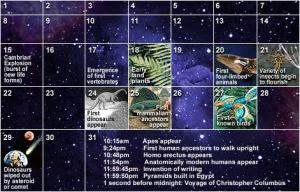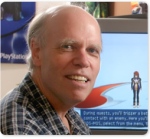Voicethread
Voicethread is a useful online tool for teachers that want to add a discussion component to their online (or classroom) course that goes beyond the typical text based discussion board. You can use a video, still image, PowerPoint presentation, or text document as a central stimulus. Then class members can respond to the topic using their webcam, microphone, telephone or text. It features a well-designed, easy to use interface that makes a nice addition to the traditional online communications tools used in teaching. Voicethread accounts are available in both free and premium versions, with a special management tool for classroom use.
Here’s a link to a Voicethread that provides a introduction to this tool :
Manifold: Space, Time and Origin
If you wish to grapple with big ideas related to our present and future, as well as examine our place in the larger scheme of things, the Manifold series by science fiction author (and engineer, mathematician) Stephen Baxter will take you on an epic journey. The author’s extraordinary imagination may have you examining the very meaning of humankind’s existence and your own perspective on our future. If nothing else, the journey will provide a pause from the daily routine and time to reflect.
The three books can be read in any order. The main characters are the same in all volumes, but their lives take very different turns (almost like parallel universes). There is a fair amount of scientific content included which may be beyond the average reader’s comprehension, however that does not detract from the power of the stories. If anything, reading the books can increase one’s desire to learn more about math, physics, chemistry and astronomy. I’d recommend starting with either the Time or Origin volume and leaving Space for last. It’s the slowest to develop, but the final ride is definitely worth the trip.
The Role of Gaming in the Future of Education
James Paul Gee, a professor at Arizona State University, is known for his work on the educational applications of video and computer games. In this short video he shares some of his ideas on the power of these technologies to prepare students for the future.
http://www.pbs.org/wgbh/pages/frontline/digitalnation/learning/games-that-teach/video-games-101.html
Future Food Shortages
“As early as 2008, humanity had just thirty seven days’ worth of grain supply in reserve. It’s been said that the ancient Romans had a more generous buffer against famine. As a result of rising food prices, India, the Philippines and some other nations have now banned the export of certain types of rice. The Haitian government, which acted too late, fell in early 2008 as a result of food riots. Unless a solution is found, the situation is likely to become worse as the century progresses, because it is projected that by 2050 there will be 9 billion mouths to feed, as opposed to today’s 6.6 billion…
Fifty years ago, there were approximately 2.5 acres of arable land for every person on earth, and the leaky, wasteful, polluting agricultural practices that had remained unchanged for thousands of years were adequate. But by the middle of this century, there will be less than half an acre of arable land per head. Unless we find ways to use that land sustainably and creatively, humanity has no future.”
Tim Flannery – from his book Now or Never (2009)
History’s Role in Future Decision Making
The following selection from Edward Cornish’s book “Futuring” highlights the role that knowledge of history can play in making decisions that impact our future:
If you are ignorant of history, you will be unduly influenced by your personal experience, which is extremely limited. You will not benefit from the experiences of other people who, down through history, have faced circumstances similar to yours…
The simple truth that emerges from the past is that we live in a world full of risks, and the challenge is to learn how to assess them carefully and choose only those that are really worth taking…
Thucydides, the greatest of the ancient Greek historians, can also be regarded as perhaps the first futurist, because he did not write his histories simply to recount events for the entertainment of readers, but rather to provide guidance for the future. Thucydides believed that foresight was the most important skill for people to have when they make important decisions. Foresight depends on knowing what happened in the past because similar things were likely to happen in the future. Accordingly, Thucydides attempted to be absolutely factual in reporting what happened in the past: “I have not written for immediate applause [like his rival Herodotus!] but for posterity, and I shall be content if the future student of these events, or of other similar events,…finds my narrative of them useful.”
NSF’s “Discoveries”
The National Science Foundation’s “Discoveries” web page features a number of articles on scientific discoveries and advancements that have implications for the future.
“NSF’s public investment in science, engineering, education and technology helps to create knowledge and sustain prosperity. Read here about the Internet, microbursts, Web browsers, extrasolar planets, and more… a panoply of discoveries and innovations that began with NSF support.”
Transforming the 20th Century Mind
In his article “Transforming the 20th Century Mind,” Rick Smyre, founder of the organization Communities of the Future, argues for the development of a different set of thinking skills to meet the demands of the 21st century. His focus is on the role of education, particularly that of higher education. He sees the need for the creation of future institutes and the integration of future oriented courses in education, with the community college as a particularly appropriate environment for this initiative.
Here are some highlights from the article:
We teach achievement, content, outcomes, and results. The way we are taught to learn imbues us with the assumption that outcomes and actions are the most important factors. As a result, when we evaluate learning, we test content and knowledge. Why? So that we can get on with it, so that we can do something, so that we can achieve.
Our educational system doesn’t emphasize conceptual thinking, knowing “why” things work, and knowing how to ask appropriate questions. Within the recent past we haven’t put a premium on ideas. We haven’t seen “talking about concepts” as a good use of time. So we hold underlying assumptions constant and seek improvement in what we do. We just decide to speed things us and make them more efficient.
Such “thinking” has led us to set standards, to get to the bottom line quickly. The premium has been on doing, not thinking…
the most important question – how do we introduce into educational curricula the need to think about the impact of future trends as well as transforming underlying assumptions? How can schools, community colleges, and universities begin to create a learning environment so that issues are considered within an evolving “futures context?”
———-
Present curricula are usually based on standard answers. Our society is increasingly fast-paced, interdependent and complex. As a result, a problem exists in how to adjust to prepare a different kind of learning experience which will prepare learners to think differently and build skills of innovation for a constantly changing society. Therefore, a concept of focusing on the future within a context of a transformation would allow new ideas to “appear” as generative dialogue occurs.
What is needed is a separate and parallel structure which can be attached to existing educational structures to think about future trends, but remain autonomous. Such a “futures institute” could be established to provide community research and development and allow new trends and knowledge to “appear” in the thinking and operations of educational institutions and local communities.
———–
Although any educational institution can establish a “futures institute,” there is no better place to position one than at a local community college. Not only is there potential to prepare existing students to utilize a futures focus and to think differently, but there exists the opportunity to introduce 21st century ideas into the thinking and operations of organizations in the local community.
Local community colleges can establish new structures and outreach efforts more easily than public schools and universities as a result of their mission.
There are several approaches that any community college can take when creating a curricula for a “futures institute:”
- Establish a day of “futures orientation” where all students
are introduced to future trends of all types.- Develop a set of “futures modules” for all areas of
knowledge. Utilize these modules in many different ways,
both within the structure of the curricula, as well as for
community seminars.- Create a series of courses that can be utilized any quarter or semester
Barry Schuler: Genomics 101
In this 21 minute video, Barry Schuler provides an engaging and highly informative look at the current state of genomic research and its enormous implications for the future. Presenting the science of genomics in a clear and understandable fashion, he points out the similarities between programing software and the potential for programming the DNA of organisms.
Vodpod videos no longer available.
The world of 2020 and beyond
“No-one can predict the future, but perhaps the most authoritative and authentic description of the future comes from interviews with the world’s leading scientists. I have interviewed the 150 top scientists who are inventing the future, in three areas: life, the mind, and matter, which are the three pillars of science.”
—Michael Kaku
Michio Kaku, professor of Theoretical Physics, City University of New York offers these thoughts on the future from his 2005 conference presentation posted on The Futures Foundation web site.
The Universe in One Year

December
The following website provides an interesting conceptual view of the development of the universe and the much more recent evolution of life on earth in the form of a calendar.

